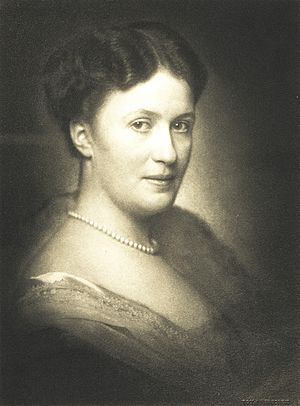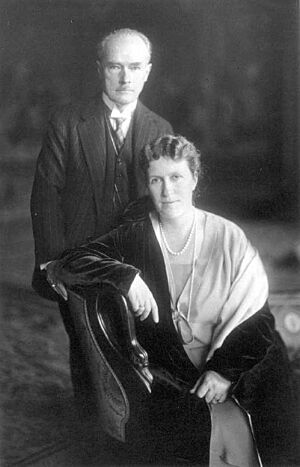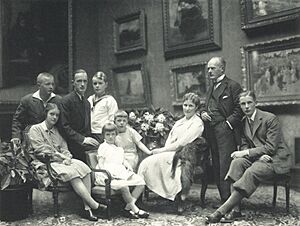Bertha Krupp facts for kids
Quick facts for kids
Bertha Krupp von Bohlen und Halbach
|
|
|---|---|

Bertha Krupp
|
|
| Born |
Bertha Krupp
29 March 1886 |
| Died | 21 September 1957 (aged 71) Essen, North Rhine-Westphalia, West Germany
|
| Spouse(s) |
Gustav Krupp von Bohlen und Halbach
(m. 1907) |
| Children | 8 |
| Parent(s) | Friedrich Alfred Krupp (1854–1902) Baroness Margrethe von Enden |
Bertha Krupp von Bohlen und Halbach (born March 29, 1886, died September 21, 1957) was an important member of the Krupp family. This family owned a huge industrial company in Germany during the 1800s and 1900s. Bertha was the oldest child and inherited the entire Krupp company in 1902. Even though she owned it, her husband, Gustav Krupp von Bohlen und Halbach, managed the company for her. Later, in 1943, her son Alfried took over the company.
Contents
Bertha Krupp's Early Life and Family
Bertha Krupp was born in Essen, Germany. This city was the home of the Krupp family and their big company for hundreds of years. Her mother was Baroness Margrethe von Enden. When Bertha was born, her grandfather, Alfred Krupp, owned the company. After he passed away, her father, Friedrich, took over. Bertha had a younger sister named Barbara. The family was concerned about who would run the company next, as there were no sons to inherit it.
Becoming the Owner of Krupp Industries
In 1902, Bertha's father, Friedrich Alfred Krupp, died. This meant Bertha became the owner of the huge Krupp businesses. However, people at the time thought it was not suitable for a woman to control such a large company. The company made things like coal, steel, and weapons for the government.
Kaiser Wilhelm II, who was the German Emperor, personally helped find a good husband for Bertha. He suggested Gustav von Bohlen und Halbach, who was a diplomat and well-known at the Kaiser's court. Bertha and Gustav got married on October 15, 1906. Bertha became the sole owner of the company. Gustav added "Krupp" to his last name and took charge of running the company. Bertha's sister, Barbara, received a large amount of money instead of a share in the company.
Bertha's Children
Gustav and Bertha had eight children together. Their names were Alfried (born 1907), Arnold (born 1908), Claus (born 1910), Irmgard (born 1912), Berthold (born 1913), Harald (born 1916), Waldtraut (born 1920), and Eckbert (born 1922).
Only Alfried, as the oldest son, used the last name Krupp von Bohlen und Halbach. The other children used the last name von Bohlen und Halbach. Sadly, Claus and Eckbert died while serving in World War II. Harald was held captive in the Soviet Union for ten years.
The "Big Bertha" Cannon
During World War I, the Krupp company made very large cannons called mortars. The German army used these cannons to attack forts in Belgium and France. German soldiers gave these cannons the nickname Dicke Bertha, which means "Big Bertha," after Bertha Krupp von Bohlen und Halbach.
Later, Allied troops also used the name "Big Bertha" to describe all large German long-range artillery. This included cannons that fired shells at Paris in 1918. The "Big Bertha" name became very famous because of the Paris Gun. This was a huge German cannon made from three artillery barrels joined together. It could shoot shells up to 75 miles away. When it first appeared, it was a big surprise to the people of Paris, who had only been attacked by German aircraft before.
Changes in Company Ownership During World War II
In 1941, Gustav Krupp von Bohlen und Halbach had a stroke, and his health became very poor. In 1943, Adolf Hitler issued a special rule called the Lex Krupp. This rule gave full ownership of the Krupp company to Bertha's son, Alfried. The company was very important for Germany's war efforts. Alfried then took control of the company. Bertha took Gustav to a family home in Tyrol, where they stayed until the war ended.
After the War
In 1945, Gustav was accused of being a war criminal. However, he was declared too sick to go to trial and passed away in 1950. Alfried Krupp von Bohlen und Halbach was also accused of crimes related to how the Krupp company used and mistreated prisoners from concentration camps as forced labor in their factories. One of these factories, called Berthawerk, was named after Bertha. Alfried was sentenced to twelve years in prison and lost all his property. He was released after five years in 1951. The US High Commissioner in Germany, John J. McCloy, decided to free him, believing there was no longer a risk of a Nazi revival.
In 1951, Bertha Krupp returned to Essen with Alfried. Alfried took control of the company again and quickly made it a very important part of the German economy. The company no longer made weapons. Bertha became a much-loved person in Essen. She was known for her charity work and for often visiting Krupp workers and their families when they were sick or injured.
Bertha Krupp von Bohlen und Halbach died in Essen on September 21, 1957. She was buried in the family's special burial place outside the city.
Bertha's Legacy
When Bertha passed away, she had five living children and many grandchildren. However, only Alfried and his only child, Arndt, had the right to use the Krupp last name. In 1966, Arndt (born 1938, died 1986) decided not to take his family's inheritance. Because of this, he lost the right to use the Krupp last name.
With Bertha's death in 1957 and her son Alfried's death in 1967, the direct line of the Krupp last name ended. Any family members with the Krupp name today are distant cousins from earlier generations.
Images for kids
See also
 In Spanish: Bertha Krupp para niños
In Spanish: Bertha Krupp para niños
 | John T. Biggers |
 | Thomas Blackshear |
 | Mark Bradford |
 | Beverly Buchanan |






